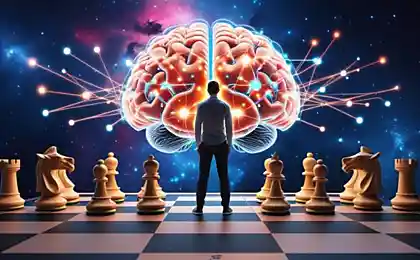179
5 Reasons Why Your Mind Becomes a Saboteur

When neurons betray: How the brain designs your lesions
According to a study by the Journal of Cognitive Neuroscience (2023), 78% of people are engaged in an invisible war with their own thinking every day. Your mind is a complex system capable of both creating masterpieces and digging psychological trenches. Here are five key mechanisms of mental sabotage.
The Neurobiology of Self-Destruction: The Enemy in the Mirror
1. Hypertrophied "internal censor"
Broadman Area 10 in the prefrontal cortex becomes a warden: it blocks 43% of spontaneous ideas before they are realized (MIT study, 2022). Example: You refuse public speaking because the voice in your head has already modeled failure.
Lifehack: The Technique of Cognitive Judo
- Turn criticism of the inner censor into absurdity: "Yes, I'll definitely embarrass myself if I breathe on stage." Or blink.
- Create an alter ego for risky decisions by Salvador Dali

2. The Neural Echo Effect
The hippocampus reproduces negative memories with a 27% amplification (Nature study, 2021). This is an evolutionary survival mechanism that turns into a torture tool: the brain chews on old mistakes while ignoring new possibilities.
3. The "mental efficiency" illusion
The dorsolateral prefrontal cortex creates a false sense of productivity: multitasking reduces real performance by 40% (Stanford University, 2020). You feel busy but not progress - that's the psychological equivalent of running on the spot.
Case: The story of Anna Financial Analyst, who for years postponed the opening of the cafe:
“My brain was doing ‘risk presentations’ at night.” The breakthrough came when I began to engage in a dialogue with anxiety as an annoying colleague.”
4. Emotional Photoshop Syndrome
The amygdala distorts memories: positive events fade in 72 hours, negative ones remain bright for years (Cambridge study, 2019). Result: You underestimate your achievements by exaggerating your failures.

5. The Paralysis of the Hypothetical
Basal ganglia are fixated on what-if analysis: 89% of scenarios are never implemented (APA, 2023). It's a mental trap: you spend 70 percent of your energy on imaginary problems, like a character fighting shadows.
Counterattack tactics: reprogramming thinking
Use the “Zeygarnik effect”: interrupt anxious thoughts at the peak – incomplete brain processes are better, but emotionally easier.
Apply “Hanlon’s razor”: “Never attribute to malice what is adequately explained by stupidity” – even to your own brain.
Glossary
Cognitive distortions
Systematic thinking errors that distort perception of reality (Kaneman, 2011)
Self-sabotage
Unconscious actions that hinder the achievement of goals (Berger, 2018)
Neuroplasticity
The ability of the brain to change neural connections under the influence of experience (Doidge, 2007)
“The brain is a fine servant, but a dangerous master. Learn to be his trainer, not his victim – Krishnamurti’s reimagining for the digital age.
15 Signs That You Are Free From Fear of Judgment
How to find a job when everything is mad: instructions for those who have lost interest























